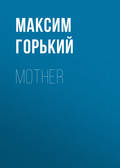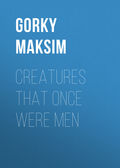
Максим Горький
The Man Who Was Afraid
He talked monotonously, colourlessly, and his speech resembled that of one in delirium.
“I have spoken it, and I have only emptied myself, that’s all. Not a trace have my words left behind them. Everything is uninjured. And within me something blazed up; it has burned out, and there’s nothing more there. What have I to hope for now? And everything remains as it was.”
Yakov Tarasovich burst into bitter laughter.
“What then, did you think to lick away a mountain with your tongue? You armed yourself with malice enough to fight a bedbug, and you started out after a bear, is that it? Madman! If your father were to see you now. Eh!”
“And yet,” said Foma, suddenly, loudly, with assurance, and his eyes again flared up, “and yet it is all your fault! You have spoiled life! You have made everything narrow. We are suffocating because of you! And though my truth against you is weak, it is truth, nevertheless! You are godless wretches! May you all be cursed!”
He moved about in his chair, attempting to free his hands, and cried out, flashing his eyes with fury:
“Unbind my hands!”
They came closer to him; the faces of the merchants became more severe, and Reznikov said to him impressively:
“Don’t make a noise, don’t be bothersome! We’ll soon be in town. Don’t disgrace yourself, and don’t disgrace us either. We are not going to take you direct from the wharf to the insane asylum.”
“So!” exclaimed Foma. “So you are going to put me into an insane asylum?”
No one replied. He looked at their faces and hung his head.
“Behave peacefully! We’ll unbind you!” said someone.
“It’s not necessary!” said Foma in a low voice. “It’s all the same. I spit on it! Nothing will happen.”
And his speech again assumed the nature of a delirium.
“I am lost, I know it! Only not because of your power, but rather because of my weakness. Yes! You, too, are only worms in the eyes of God. And, wait! You shall choke. I am lost through blindness. I saw much and I became blind, like an owl. As a boy, I remember, I chased an owl in a ravine; it flew about and struck against something. The sun blinded it. It was all bruised and it disappeared, and my father said to me then: ‘It is the same with man; some man bustles about to and fro, bruises himself, exhausts himself, and then throws himself anywhere, just to rest.’ Hey I unbind my hands.”
His face turned pale, his eyes closed, his shoulders quivered. Tattered and crumpled he rocked about in the chair, striking his chest against the edge of the table, and began to whisper something.
The merchants exchanged significant glances. Some, nudging one another in the sides, shook their heads at Foma in silence. Yakov Mayakin’s face was dark and immobile as though hewn out of stone.
“Shall we perhaps unbind him?” whispered Bobrov.
“When we get a little nearer.”
“No, it’s not necessary,” said Mayakin in an undertone-“We’ll leave him here. Let someone send for a carriage. We’ll take him straight to the asylum.”
“And where am I to rest?” Foma muttered again. “Whither shall I fling myself?” And he remained as though petrified in a broken, uncomfortable attitude, all distorted, with an expression of pain on his face.
Mayakin rose from his seat and went to the cabin, saying softly:
“Keep an eye on him, he might fling himself overboard.”
“I am sorry for the fellow,” said Bobrov, looking at Yakov Tarasovich as he departed.
“No one is to blame for his madness,” replied Reznikov, morosely.
“And Yakov,” whispered Zubov, nodding his head in the direction of Mayakin.
“What about Yakov? He loses nothing through it.”
“Yes, now he’ll, ha, ha!”
“He’ll be his guardian, ha, ha, ha!”
Their quiet laughter and whisper mingled with the groaning of the engine did not seem to reach Foma’s ear. Motionlessly he stared into the distance before him with a dim look, and only his lips were slightly quivering.
“His son has returned,” whispered Bobrov.
“I know his son,” said Yashchurov. “I met him in Perm.”
“What sort of a man is he?”
“A business-like, clever fellow.”
“Is that so?”
“He manages a big business in Oosolye.”
“Consequently Yakov does not need this one. Yes. So that’s it.”
“Look, he’s weeping!”
“Oh?”
Foma was sitting leaning against the back of the chair, and drooping his head on the shoulder. His eyes were shut, and from under his eyelids tears were trickling one after another. They coursed down his cheeks into his moustache. Foma’s lips quivered convulsively, and the tears fell from his moustache upon his breast. He was silent and motionless, only his chest heaved unevenly, and with difficulty. The merchants looked at his pale, tear-stained face, grown lean with suffering, with the corners of his lips lowered downward, and walked away from him quietly and mutely.
And then Foma remained alone, with his hands tied behind his back, sitting at the table which was covered with dirty dishes and different remains of the feast. At times he slowly opened his heavy, swollen eyelids, and his eyes, through tears, looked dimly and mournfully at the table where everything was dirty, upset, ruined.
.......
Three years have passed.
About a year ago Yakov Tarasovich Mayakin died. He died in full consciousness, and remained true to himself; a few hours before his death he said to his son, daughter and son-in-law:
“Well, children, live in richness! Yakov has tasted everything, so now it is time for Yakov to go. You see, I am dying, yet I am not despondent; and the Lord will set that down to my credit. I have bothered Him, the Most Gracious One, with jests only, but never with moans and complaints! Oh Lord! I am glad that I have lived with understanding through Thy mercy! Farewell, my children. Live in harmony, and don’t philosophize too much. Know this, not he is holy who hides himself from sin and lies calm. With cowardice you cannot defend yourself against sin, thus also says the parable of the talents. But he who wants to attain his goal in life fears not sin. God will pardon him an error. God has appointed man as the builder of life, but has not endowed him with too much wisdom. Consequently, He will not call in his outstanding debts severely. For He is holy and most merciful.”
He died after a short but very painful agony.
Yozhov was for some reason or other banished from the town soon after the occurrence on the steamer.
A great commercial house sprang up in the town under the firm-name of “Taras Mayakin & African Smolin.”
Nothing had been heard of Foma during these three years. It was rumoured that upon his discharge from the asylum Mayakin had sent him away to some relatives of his mother in the Ural.
Not long ago Foma appeared in the streets of the town. He is worn out, shabby and half-witted. Almost always intoxicated, he appears now gloomy, with knitted brow, and with head bent down on his breast, now smiling the pitiful and melancholy smile of a silly fanatic. Sometimes he is turbulent, but that happens rarely. He lives with his foster-sister in a little wing in the yard. His acquaintances among the merchants and citizens often ridicule him. As Foma walks along the street, suddenly someone shouts to him:
“Eh, you prophet, come here!”
Yet he rarely goes to those who call him; he shuns people and does not care to speak with them. But when he does approach them they say to him:
“Well, tell us something about doomsday, won’t you? Ha, ha, ha! Prophet!”






